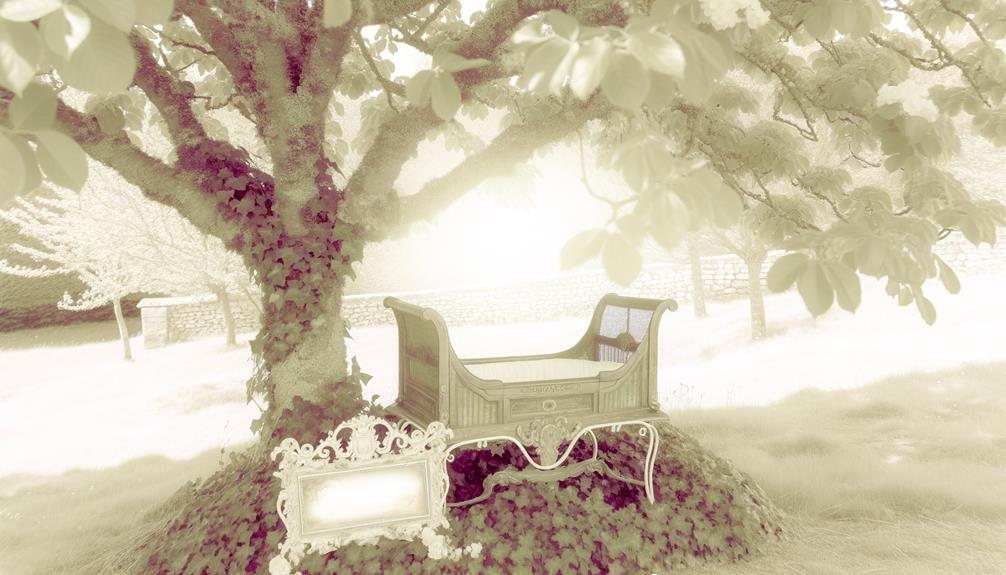Louise Name Meaning and Origin
Louise, derived from the Old High German name Ludwig meaning 'famous warrior,' originated in medieval France as the feminine form of Louis. The name bears historical significance, being associated with European royalty, such as Louise of Savoy.
It exemplifies the evolution of names influenced by French linguistic traditions. Louise also symbolizes a blend of heritage and modern identity.
Prominent individuals named Louise include poet Louise Glück and artist Louise Bourgeois. Despite its deep historical roots, Louise enjoys enduring popularity in contemporary society.
Understanding more about Louise reveals a fascinating intersection of linguistic, cultural, and historical dimensions. Furthermore, the meaning of the name Amara, which originates from various cultures including Igbo and Sanskrit, signifies “eternal” and “immortal”. This demonstrates how names can carry rich cultural significance and offer insights into a person’s background and heritage. Exploring the origins and meanings of names like Louise and Amara adds depth to our understanding of language and identity. It also highlights the interconnectedness of global cultures and the enduring importance of names in shaping personal and collective identities.

Key Takeaways
- Louise is derived from the Old High German name Ludwig, meaning 'famous warrior.'
- Originating in medieval France, Louise is the feminine form of Louis.
- The name Louise reflects historical significance and cultural heritage.
- Louise has been borne by numerous notable figures, including royalty and artists.
- Louise maintains modern popularity, blending historical legacy with contemporary identity.
Historical Background
The name Louise, with its rich historical roots, has been borne by numerous notable figures throughout European history, reflecting its enduring popularity and cultural significance.
Originating in medieval France, Louise emerged as a feminine form of Louis, itself derived from the Old High German name Ludwig, meaning 'famous warrior.' Prominent bearers of the name include Louise of Savoy, mother to King Francis I of France, and Louise of Mecklenburg-Strelitz, Queen of Prussia. These historical figures have cemented the name's association with nobility, strength, and leadership.
In literature, the name Louise has been immortalized by authors and poets, further embedding it within the cultural fabric of Europe. Consequently, Louise's historical background is both illustrious and multifaceted.
Linguistic Roots
Originating from the Old High German name Ludwig, Louise encapsulates a linguistic evolution that underscores its transformation from a masculine to a feminine appellation, reflecting broader socio-linguistic trends in name adaptation and usage across centuries.
The name Ludwig, composed of the elements 'hlud' meaning 'fame' and 'wig' meaning 'warrior,' was primarily male. Over time, the feminization of Ludwig led to the creation of Louise, aligning with the French linguistic tradition of adding the suffix '-e' to form feminine variants.
This shift illustrates the intersection of linguistic morphology and gender norms, highlighting how names evolve to fit cultural and societal constructs. Therefore, Louise represents a fascinating case study in the dynamic interplay between language and identity.
Cultural Significance
Louise has permeated various cultural milieus, serving as a poignant symbol of both heritage and evolving societal values. Its cultural significance can be dissected through multiple lenses:
- Literary Presence: Louise has graced numerous literary works, often embodying traits of strength and resilience.
- Historical Context: The name has been associated with royalty and nobility, particularly in European histories, reinforcing its regal connotations.
- Modern Adaptations: Contemporary usage reflects a blend of traditional reverence and modern sensibilities, illustrating the name's adaptability.
Analyzing these aspects reveals how Louise transcends mere nomenclature, embedding itself deeply within cultural narratives. This enduring appeal underscores the name's capacity to bridge historical legacy and contemporary identity, making it a timeless choice across generations.
Famous Bearers
Many individuals named Louise have left indelible marks across various fields, further enhancing the name's rich historical and cultural tapestry. The name Louise has been borne by queens, scientists, artists, and writers, each contributing significantly to their respective domains. Below is a table highlighting some notable figures named Louise:
| Name | Field |
|---|---|
| Louise Bourgeois | Art and Sculpture |
| Louise Brown | Science (First IVF Baby) |
| Princess Louise of the UK | Royalty |
| Louise Glück | Literature (Poet) |
| Louise Fletcher | Acting (Academy Award Winner) |
These Louises exemplify the versatility and enduring legacy of the name, showcasing its broad appeal and the remarkable achievements of its bearers. Each individual has not only excelled in their field but also contributed to the name's enduring prestige.
Modern Popularity
In contemporary society, the name Louise continues to maintain a steady presence, reflecting both its historical significance and its adaptability to modern naming trends. A closer examination reveals several factors contributing to its persistent popularity:
- Cultural Resurgence: The name Louise has seen a resurgence in various cultures, often linked to its classic appeal and ease of pronunciation across different languages.
- Celebrity Influence: Numerous public figures and celebrities have chosen the name Louise for their children, enhancing its visibility and desirability.
- Literary and Media Presence: The frequent use of Louise in literature, film, and television has kept the name relevant, appealing to new generations.
These elements collectively underscore Louise's enduring appeal in the contemporary naming landscape.
Conclusion
The name Louise, with its rich historical background and deep linguistic roots, has traversed centuries, maintaining cultural significance and modern popularity.
Coincidentally, its endurance can be seen in the numerous famous bearers who have shaped various fields, from literature to politics. This synchronicity of historical relevance and contemporary appeal underscores the name's enduring charm and versatility, marking Louise as a timeless choice across generations and cultures.
Such persistence in popularity speaks volumes about its universal resonance.






